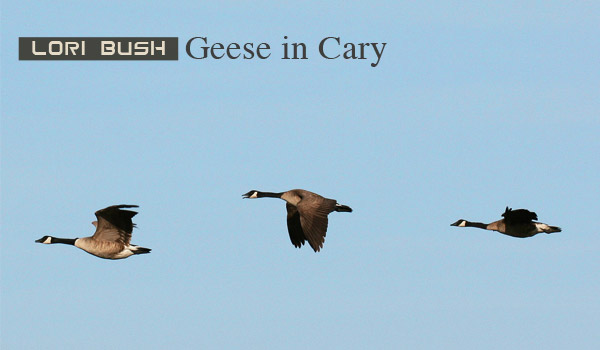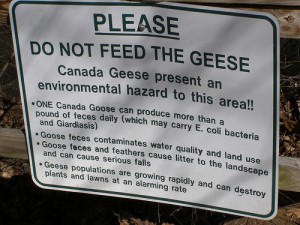Geese in Cary
From the blog of Council Member Lori Bush. Her views are her own.
Cary, NC — We receive a great number of complaints regarding the Geese that have come to call Cary their home. In many locations, there are hundreds of them, often overwhelming and becoming a nuisance in certain parks and ponds, leaving their droppings, and in some cases, becoming aggressive when they are protecting their nests.
The Unique Status of Geese
First off, the geese in our area are “Canada Geese.” (Not “Canadian Geese” as we often hear.) Canada Geese are classified as migratory birds and are a protected species that are regulated through a complicated process involving the US Department of Agriculture, the US Fish and Wildlife Service and the North Carolina Wildlife Commission.
That is to say that Canada Geese are basically protected under the Federal Migratory Bird Act of 1918 . This Act makes it illegal to harm or injure a goose and damage or move its eggs and nest, without a Federal permit. Not complying with the Federal Act can result in fines ranging from $5,000 to $10,000 and this also applies to an untrained dog’s actions.
Managing the Population of Geese
The Town has been dealing with geese at the Koka Booth Amphitheater and the WakeMed Soccer Park with varying levels of success. We actually have an agreement with the US Department of Agriculture to help manage our goose population at those facilities.
As explained to me by our town staff, that under these regulations, management of the geese population requires a “depredation permit” which means there must be property damage before such a permit can be issued.
Another consideration the Town must take into account is the fact that Cary is designated a bird sanctuary in our own ordinances which provide protection for wild birds. This does not mean that we would not take measures, where appropriate, to address any damage created by such birds but only that we must carefully weigh the pros and cons of such issues.
Until the federal government takes action and removes the protections that are established for these birds, the Town (and private property owners) is very limited on what we can do.
What can you do?
Photo by MyStuart
- Don’t feed the Geese. Feeding the geese just makes them want to stay, and they tend to congregate when food is easy to find.
- Stay away from the nests – Geese tenaciously defend their nests and goslings. Pay attention to where you are, and if you are close to a nest – you don’t want to provoke a defensive response by the female or male.
- Harassment – scaring the geese can be used effectively, but there are some programs in place to ensure you do it safely, and humanely.
As always, thanks for listening and please feel free to contact me with any questions, comments or concerns.
—————————————————————————————–
Lead photo by Philip Bouchard.





The Federal Migratory Bird Act of 1918 is in serious need of updating. There needs to be a reclassification of “migratory” birds that no longer migrate during the appropriate seasons.
And appropriate remedies should be allowed, without having to jump through a series of hoops, to prevent overpopulation and deal with the health and enviromental issues associated with their droppings.
If you’ve ever seen the green scum growing on what used to be clean ponds these creatures congragate at, you’ll understand why I mention enviromental issues.
Large areas of grassy, well-manicured lawn (i.e. golf courses, cemeteries, large business or industrial parks) will be a huge attraction for Canada Geese. Geese like the short, well-manicured, fertilized grasses we grow all over our suburban areas. This proves to be ample feeding grounds for the geese; they can graze these areas for long periods of time.
Fertilized grass is preferred over non-fertilized by geese, so reducing your use of fertilizer will provide some discouragement. Though it may not always be feasible, by decreasing the size of your lawn areas, you will decrease the numbers of nuisance geese flocking to your property.
==============
Hunch: Cary’s manicured medians = some geese are a traffic hazard!
==============
Source: http://www.wildgoosechasers.com/tips/canada-goose-tips.php#3
==============
It’s not the geese but the geese poop. Isn’t their poop considered a health issue? It’s everywhere in the parks and in some hoods. It’s nasty!